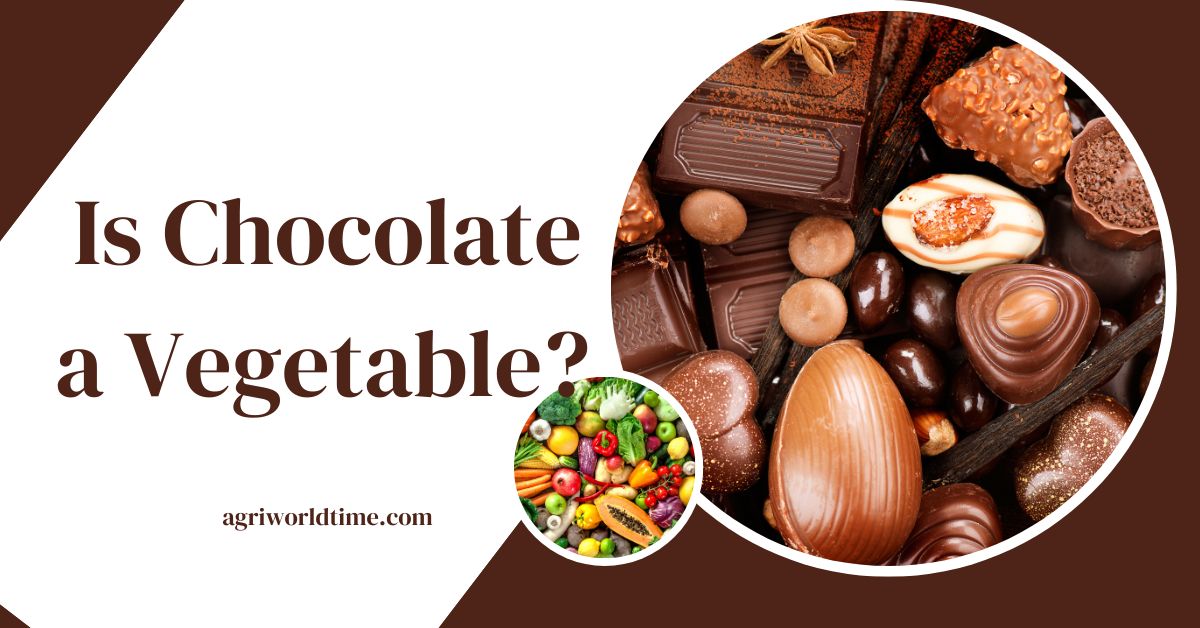In the ever-changing landscape of consumer preferences, the chocolate industry faces new challenges driven by a growing emphasis on sustainability and healthier lifestyles. However, one constant remains—consumer interest in chocolate. According to Statista In the United States alone, an astonishing 3 billion kilograms of chocolate confectionery are consumed annually. This journey begins with cocoa, cultivated from the tropical Theobroma cacao tree, with roots dating back over three millennia, primarily in Central and South America. Interestingly, today, the bulk of cocoa production occurs in Africa, mainly to meet the relentless demand of American consumers. This article delves into the intriguing question: Is chocolate a vegetable? Let’s explore the world of cocoa beans, chocolate production, and the surprising connection between chocolate and vegetables.
The Origin of Chocolate
The Cocoa Bean – Nature’s Gift
Chocolate starts as a humble cocoa bean, the dried and fully fermented seed of Theobroma cacao. These beans are the foundation of all chocolate products.
Ancient Mayan and Aztec Use
The history of chocolate dates back to ancient Mesoamerican civilizations, where cocoa beans were used to create a bitter, frothy beverage. The Mayans and Aztecs considered it a divine elixir consumed during religious ceremonies.
The Chocolate-Making Process
From Bean to Bar
Chocolate-making is a complex process that involves several stages, including fermentation, drying, roasting, and grinding. These processes transform cocoa beans into cocoa mass, the essence of chocolate.
Adding Sweetness
Sugar and other ingredients are added to cocoa mass to create the chocolate bars we know and love. But does the addition of sugar make chocolate a vegetable?
Chocolate vs. Vegetables
Nutritional Content
Chocolate contains some nutrients in vegetables, such as antioxidants and minerals. However, it also has a high sugar and fat content, which sets it apart from vegetables in terms of overall nutrition.
Vegetable-Like Qualities
One argument favoring chocolate as a “vegetable” is that it comes from a plant, just like many vegetables. However, this oversimplification ignores the significant differences in nutritional value.
Debunking the Myth
Sugar and Fat Content
While cocoa beans come from a plant, the extensive processing and addition of sugar and fats in chocolate fundamentally change its nutritional profile. Vegetables, on the other hand, are typically low in sugar and fat.
Health Implications
Consuming chocolate in moderation can have health benefits due to its antioxidants. Still, excessive consumption can lead to weight gain and other health issues. In contrast, vegetables are universally recognized as essential for a balanced diet.
Nutritional Content of Chocolate:
| Chocolate Type | Calories | Fat (g) | Saturated Fat (g) | Carbohydrates (g) | Fiber (g) | Sugar (g) | Protein (g) |
| Dark Chocolate (70-85% cocoa) | 170 | 12.1 | 6.95 | 6.9 | 2.9 | 5.3 | 2.2 |
| Dark Chocolate (60-70% cocoa) | 150 | 10.4 | 5.6 | 6.5 | 2.8 | 4.8 | 2 |
| Milk Chocolate | 151 | 8.4 | 5.2 | 16.8 | 0.9 | 14.7 | 2.1 |
| White Chocolate | 152 | 9.1 | 5.5 | 16.7 | 0.1 | 16.7 | 1.7 |
It’s important to note that these nutritional values are general estimates and can vary depending on the specific brand and type of chocolate you choose.
When we look at the nutritional breakdown, it becomes evident that dark chocolate has the lowest calorie and fat content while boasting the highest fiber and protein levels. Additionally, dark chocolate is richer in antioxidants than milk chocolate or white chocolate. Antioxidants play a crucial role in safeguarding your cells from potential damage.
Dark chocolate is the way to learn if you’re seeking a healthier chocolate option. Nevertheless, exercising moderation while indulging in chocolate remains imperative, as it still carries a significant calorie and sugar load.

Here are some handy pointers for savoring chocolate in moderation:
1. Opt for dark chocolate with at least 70% cocoa content.
2. Treat yourself to a small serving of chocolate, around 1 ounce, following a meal.
3. Enhance your chocolate experience by pairing it with fruits or nuts to add extra fiber and protein.
4. Keep your chocolate consumption a few times weekly to maintain a balanced diet.
By following these guidelines, you can relish the delectable taste of chocolate without compromising your overall health.
Conclusion
In conclusion, while the origins of chocolate may be traced back to the cocoa bean—a product of nature akin to vegetables—it is crucial to recognize that extensive processing and adding sugar and fats transform chocolate into a delectable treat distinct from its vegetable counterparts. While chocolate, especially dark chocolate, offers certain health benefits when enjoyed in moderation, it should not replace the essential role of vegetables in a balanced diet. So, the answer to the intriguing question, “Is chocolate a vegetable?” remains a resounding no. Chocolate remains a delightful indulgence, best savored responsibly within the broader context of a health-conscious lifestyle.
FAQs
1. Is chocolate healthy for you?
Chocolate can have health benefits when consumed in moderation due to its antioxidants, but excessive consumption is not advisable.
2. Can chocolate be considered a vegetable due to its cocoa bean origin?
While cocoa beans are a plant product, chocolate undergoes extensive processing and the addition of sugar and fats, making it distinctly different from vegetables.
3. Are there any vegetables in chocolate?
Chocolate does not contain actual vegetables. It is made primarily from cocoa beans, sugar, and fats.
4. What are the health risks associated with excessive chocolate consumption?
Overconsumption of chocolate can lead to weight gain, dental issues, and other health problems due to its high sugar and fat content.
5. How can I healthily enjoy chocolate?
To enjoy chocolate healthily, limit your consumption, opt for dark chocolate with higher cocoa content, and incorporate it into a balanced diet rich in Vegetables and fruits.

